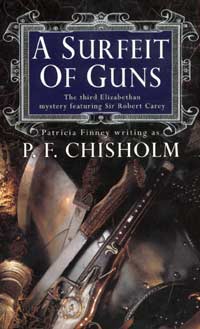A SURFEIT OF GUNS
By P F Chisholm
(third in the Carey series)
On the track of a stolen shipment of handguns, Sir Robert Carey crosses the dangerous Border, to Dumfries and an encounter with King James VI of Scotland.
He finds James and his courtiers more dissolute than ever, his lost love Elizabeth still firmly shackled to her odious husband – and the seductive Emilia Bonnetti more than willing to take her place.
The Italian lady’s real interest is guns, possibly for the rebels in Ireland. Carey is gallant enough to help her, risking charges of treason in two kingdoms…
“First-rate” Sunday Telegraph.

First page sample:
![]() Friday, 7th July 1592, late afternoon
Friday, 7th July 1592, late afternoon
![]() Sir Robert Carey woke up to a knock on the door, feeling sticky-mouthed and bad-tempered and uncertain what time of day it was. He was in his clothes with his doublet buttons undone, his boots by the side of the bed. Through the window the diamond mosaic of sky had greyed over. Barnabus Cooke his man-servant came stumping in carrying a bowl of cold water, a towel over one arm, a leather bottle of small beer under the other.
Sir Robert Carey woke up to a knock on the door, feeling sticky-mouthed and bad-tempered and uncertain what time of day it was. He was in his clothes with his doublet buttons undone, his boots by the side of the bed. Through the window the diamond mosaic of sky had greyed over. Barnabus Cooke his man-servant came stumping in carrying a bowl of cold water, a towel over one arm, a leather bottle of small beer under the other.
![]() “Afternoon, sir,” he said in his familiar adenoidal whine. “Sergeant Dodd wants to know where you was thinking of patrolling tonight.”
“Afternoon, sir,” he said in his familiar adenoidal whine. “Sergeant Dodd wants to know where you was thinking of patrolling tonight.”
![]() Ah. Night patrol, therefore an afternoon nap.
Ah. Night patrol, therefore an afternoon nap.
![]() “I haven’t decided yet,” Carey answered.
“I haven’t decided yet,” Carey answered.
![]() He sat up and swung his legs over the side of the bed, hearing the elderly strapping creak beneath the mattress. Although the bed had once been honoured by the sleeping body of Her Majesty the Queen of Scots while she was briefly an uneasy guest in Carlisle, tht was nearly thirty years before and it had had a hard life since then. He honestly thought a straw pallet on the floor might be more comfortable and certainly less noisy.
He sat up and swung his legs over the side of the bed, hearing the elderly strapping creak beneath the mattress. Although the bed had once been honoured by the sleeping body of Her Majesty the Queen of Scots while she was briefly an uneasy guest in Carlisle, tht was nearly thirty years before and it had had a hard life since then. He honestly thought a straw pallet on the floor might be more comfortable and certainly less noisy.
![]() While he splashed his face with cold water and drank some of the beer, Carey gathered his thoughts and tried to wake up properly. Barnabus fastened his many buttons, helped him on with his jack. As always there was a depressing moment when the padded, double-layered leather coat, with its metal plates in between, weighed him down like original sin. Then, once it was laced and his belt buckled so the weight was evenly distributed between his shoulders and hips, his body adjusted and he no longer felt it. As armour went, it was very comfortable, much better than his tilting plate that was in pawn down in London. He had his new broadsword, the best the Dumfries armourers could produce, and Barnabus had oiled it well, though the hilt still felt rough and odd against his hand after he had strapped it on. His helmet was a fine piece, a blued-steel morion, with elaborate chasing on its peaks and curves, well-padded inside. He knew it made him conspicuous, but that was the idea after all – his men needed to know where he was in a fight.
While he splashed his face with cold water and drank some of the beer, Carey gathered his thoughts and tried to wake up properly. Barnabus fastened his many buttons, helped him on with his jack. As always there was a depressing moment when the padded, double-layered leather coat, with its metal plates in between, weighed him down like original sin. Then, once it was laced and his belt buckled so the weight was evenly distributed between his shoulders and hips, his body adjusted and he no longer felt it. As armour went, it was very comfortable, much better than his tilting plate that was in pawn down in London. He had his new broadsword, the best the Dumfries armourers could produce, and Barnabus had oiled it well, though the hilt still felt rough and odd against his hand after he had strapped it on. His helmet was a fine piece, a blued-steel morion, with elaborate chasing on its peaks and curves, well-padded inside. He knew it made him conspicuous, but that was the idea after all – his men needed to know where he was in a fight.
